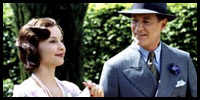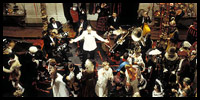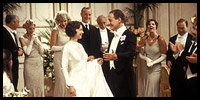
 |
|
De-Lovely (2004) Cast: Kevin Kline, Ashley Judd, Jonathan Pryce, Kevin McNally, Sandra Nelson, Allan Corduner, Peter Polycarpou, Keith Allen, Edward Baker-Duly, John Barrowman, James Wilby, Kevin McKidd, Richard Dillane, Harry Ditson, Angie Hill, Alanis Morissette, Robbie Williams, Elvis Costello, Natalie Cole, Sheryl Crow, Diana Krall, Vivian Green, Caroline O'Connor, Lemar Obika, Mick Hucknall, Lara Fabian, Mario Frangoulis 2004 – 130 minutes Rated: Reviewed by Dustin Putman, July 2, 2004.  Biographies are one of the most commonplace and uneven genres of film. With most taking a straightforward point-A-to-point-B approach, they tend to lack spontaneity and urgency, getting caught up in the facts and losing sight of why its human subject's life was worth making a movie about. Worse yet, the majority of cinematic biographical tellings never rise above the level of a sleek TV-movie; because there is little complexity in simply following a person from birth to death, the small-screen format is more fitting.
Biographies are one of the most commonplace and uneven genres of film. With most taking a straightforward point-A-to-point-B approach, they tend to lack spontaneity and urgency, getting caught up in the facts and losing sight of why its human subject's life was worth making a movie about. Worse yet, the majority of cinematic biographical tellings never rise above the level of a sleek TV-movie; because there is little complexity in simply following a person from birth to death, the small-screen format is more fitting.
 Centering on the life of classic composer Cole Porter, "De-Lovely" avoids the usual pitfalls of the genre by invigorating narrative creativity and a deeply involving core relationship into the proceedings. As a musical—one in which the main actors sing on occasion, and there are extended performances from the likes of Alanis Morissette, Robbie Williams, Elvis Costello, Diana Krall, Sheryl Crow, and Natalie Cole—the film is particularly solemn. There is energy to the incendiary music selections, and some upbeat numbers, but for the most part this is a contemplative, unhurried drama that tells of a 35-year love story both sumptuously romantic and unavoidably sad. The mixture of light comic fodder with notably darker flourishes compliments each other, keeping the momentum from flagging even as the film must explore, quite maturely, the raw and unaffected corners of human nature and impulses as they relate to the bond of an unlikely marriage.
Centering on the life of classic composer Cole Porter, "De-Lovely" avoids the usual pitfalls of the genre by invigorating narrative creativity and a deeply involving core relationship into the proceedings. As a musical—one in which the main actors sing on occasion, and there are extended performances from the likes of Alanis Morissette, Robbie Williams, Elvis Costello, Diana Krall, Sheryl Crow, and Natalie Cole—the film is particularly solemn. There is energy to the incendiary music selections, and some upbeat numbers, but for the most part this is a contemplative, unhurried drama that tells of a 35-year love story both sumptuously romantic and unavoidably sad. The mixture of light comic fodder with notably darker flourishes compliments each other, keeping the momentum from flagging even as the film must explore, quite maturely, the raw and unaffected corners of human nature and impulses as they relate to the bond of an unlikely marriage.
 An elderly Cole Porter (Kevin Kline) is taken on a journey through the major events of his life and marriage by Gabe (Jonathan Pryce), an enigmatic, God-like figure. One of the most prolific composer/lyricists of all time, Cole meets the beautiful Linda (Ashley Judd) in 1919 and, with her acting as his muse, they quickly marry. Their love for one another is unconditional and beyond definition, but it comes with one roadblock: Cole is gay. While Linda recognizes that Porter can never care for her in quite the same way she does him, they stay together, even with the mutual understanding that Cole will never be completely faithful. Just as Cole's star is further rising, his work taken from the New York stage to Hollywood productions, both he and Linda suffer devastating physical setbacks. Like a transcendent melody, all good things must come to an end.
An elderly Cole Porter (Kevin Kline) is taken on a journey through the major events of his life and marriage by Gabe (Jonathan Pryce), an enigmatic, God-like figure. One of the most prolific composer/lyricists of all time, Cole meets the beautiful Linda (Ashley Judd) in 1919 and, with her acting as his muse, they quickly marry. Their love for one another is unconditional and beyond definition, but it comes with one roadblock: Cole is gay. While Linda recognizes that Porter can never care for her in quite the same way she does him, they stay together, even with the mutual understanding that Cole will never be completely faithful. Just as Cole's star is further rising, his work taken from the New York stage to Hollywood productions, both he and Linda suffer devastating physical setbacks. Like a transcendent melody, all good things must come to an end.
 Scripted by Jay Cocks (2002's "Gangs of New York") and directed by Irwin Winkler (2001's "Life as a House"), "De-Lovely" is a poetic and mostly informative look at a man who may have died nearly 40 years ago, but whose music continues to thrive to this day. Even if they have never heard of Cole Porter, or aren't quite sure who he is, viewers will be all the more surprised with how intimately familiar they are with his work, including such classics as "Let's Misbehave," "Let's Do It, Let's Fall in Love," "Night and Day," "Anything Goes," and "It's De-Lovely." Cocks and Winkler have further succeeded admirably at humanizing Cole Porter far and away beyond his career. He is hugely talented, yes, but his personal flaws and the mistakes he makes, juggling a wife he cares for while never the least bit regretful of his countless infidelities, are not shined away from, either. Cole Porter may not have been the poster child for idealistic perfection, but he was always forthright and honest with his wife, and cared about her as much as anyone could have—a fact that kept them together for over three decades.
Scripted by Jay Cocks (2002's "Gangs of New York") and directed by Irwin Winkler (2001's "Life as a House"), "De-Lovely" is a poetic and mostly informative look at a man who may have died nearly 40 years ago, but whose music continues to thrive to this day. Even if they have never heard of Cole Porter, or aren't quite sure who he is, viewers will be all the more surprised with how intimately familiar they are with his work, including such classics as "Let's Misbehave," "Let's Do It, Let's Fall in Love," "Night and Day," "Anything Goes," and "It's De-Lovely." Cocks and Winkler have further succeeded admirably at humanizing Cole Porter far and away beyond his career. He is hugely talented, yes, but his personal flaws and the mistakes he makes, juggling a wife he cares for while never the least bit regretful of his countless infidelities, are not shined away from, either. Cole Porter may not have been the poster child for idealistic perfection, but he was always forthright and honest with his wife, and cared about her as much as anyone could have—a fact that kept them together for over three decades.
 For a motion picture that focuses on a marriage between a straight woman and a homosexual man, "De-Lovely" is unremittingly romantic. Sex is a rare occurrence between Cole and Linda—they don't even sleep in the same bedroom—but it is this refreshing non-issue that lays the path for what matters most in a lasting relationship: compassion, supportiveness, truthfulness, and a profound emotional connection. Kevin Kline (2002's "The Emperor's Club") and Ashley Judd (2004's "Twisted") carry the entire film (all supporting players are peripheral to the main story), and this is some of their most astonishing respective work in memory. Kline seems to have channeled the real-life Cole Porter in his preparation, and blesses him with a gentle sympathy; even when Cole is doing the wrong thing, you can't help but be won over by his charm and genius. Judd, after slumming it for years in interchangeable thrillers about serial killers and corruption ("Twisted," 2002's "High Crimes," 1999's "Double Jeopardy," 1997's "Kiss the Girls," et al.), returns to the beguiling, unaffected, poignant work of her brilliant debut feature, 1993's "Ruby in Paradise." At the risk of sounding cliched, Kline and Judd are a match made in heaven; their connection and chemistry are sharply felt at every turn, and both actors seem to have really burrowed into their characters' psyche, finding the appropriate joy and pathos of this couple's life together.
For a motion picture that focuses on a marriage between a straight woman and a homosexual man, "De-Lovely" is unremittingly romantic. Sex is a rare occurrence between Cole and Linda—they don't even sleep in the same bedroom—but it is this refreshing non-issue that lays the path for what matters most in a lasting relationship: compassion, supportiveness, truthfulness, and a profound emotional connection. Kevin Kline (2002's "The Emperor's Club") and Ashley Judd (2004's "Twisted") carry the entire film (all supporting players are peripheral to the main story), and this is some of their most astonishing respective work in memory. Kline seems to have channeled the real-life Cole Porter in his preparation, and blesses him with a gentle sympathy; even when Cole is doing the wrong thing, you can't help but be won over by his charm and genius. Judd, after slumming it for years in interchangeable thrillers about serial killers and corruption ("Twisted," 2002's "High Crimes," 1999's "Double Jeopardy," 1997's "Kiss the Girls," et al.), returns to the beguiling, unaffected, poignant work of her brilliant debut feature, 1993's "Ruby in Paradise." At the risk of sounding cliched, Kline and Judd are a match made in heaven; their connection and chemistry are sharply felt at every turn, and both actors seem to have really burrowed into their characters' psyche, finding the appropriate joy and pathos of this couple's life together.
 If Irwin Winkler is adept as a filmmaker from a humanistic standpoint, he is less suitable for handling the musical sequences. Unlike such recent genre efforts as 2001's "Moulin Rouge" and 2002's "Chicago," where there was visionary pinache to the song-and-dance routines, and a real style to how they were choreographed and filmed, the musical numbers in "De-Lovely" are oftentimes static. Winkler shoots them straight on and with little movement or fluidity, save for two unexpected exceptions that are easily the highlights out of all the song numbers. Fortunately, what magic the film lacks in terms of its musical genre, it amicably makes up for with the sheer quality of the source material. Simply put, Cole Porter's music was, as still is, unparalleled in terms of its multilayered lyrics, its gorgeous arrangement, and its overall amorous jubilance. And as for Cole Porter himself, Winkler does a splendid job of bringing this virtuouso man into the 21st-century and making his one-of-a-kind life one worth making a film about. The final scene, especially, is lyrical in its unforced simplicity. Cole and Linda may not have been a traditional husband and wife, but they completed each other in a way no one else in the world probably could have, and were all the better because of it.
If Irwin Winkler is adept as a filmmaker from a humanistic standpoint, he is less suitable for handling the musical sequences. Unlike such recent genre efforts as 2001's "Moulin Rouge" and 2002's "Chicago," where there was visionary pinache to the song-and-dance routines, and a real style to how they were choreographed and filmed, the musical numbers in "De-Lovely" are oftentimes static. Winkler shoots them straight on and with little movement or fluidity, save for two unexpected exceptions that are easily the highlights out of all the song numbers. Fortunately, what magic the film lacks in terms of its musical genre, it amicably makes up for with the sheer quality of the source material. Simply put, Cole Porter's music was, as still is, unparalleled in terms of its multilayered lyrics, its gorgeous arrangement, and its overall amorous jubilance. And as for Cole Porter himself, Winkler does a splendid job of bringing this virtuouso man into the 21st-century and making his one-of-a-kind life one worth making a film about. The final scene, especially, is lyrical in its unforced simplicity. Cole and Linda may not have been a traditional husband and wife, but they completed each other in a way no one else in the world probably could have, and were all the better because of it.
|
© 2004 by Dustin Putman |














